|
Latest news from the Grand Bargain | July 2020
|
|
|
Dear Grand Bargain Signatories,
We were pleased to hear and see so many of you (more than 200!) at the Grand Bargain Annual Meeting in June 2020, albeit only virtually. The online nature of the meeting did not prevent us from having constructive discussions on how to move forward, which will be reflected in the upcoming summary note.
As we dive into the summer, we are pleased to share with you a number of materials demonstrating a vast progress and body of knowledge in several of the workstreams - including a new prototype to visualise COVID-19 funding, guidance notes on localisation, and several studies showcasing the added value of flexible funding and existing good practices of quality funding that should be replicated.
Below you will also find some examples of the Grand Bargain implementation at country level, and an update from the Facilitation Group on what's coming up in the next couple of weeks.
Happy summer reading and best regards,
The Grand Bargain Secretariat
|
|
|
| Latest from the workstreams |
|
| For further information or to reach out to the workstream Co-convenors, please contact the Grand Bargain Secretariat at gbsecretariat@un.org. |
|
|
| Workstream 1 (Greater Transparency) |
|
New tool facilitates greater transparency and coordination in COVID-19 financing
To try to provide an overview of the collective response to COVID-19, the World Bank Group and the Government of the Netherlands, as Co-Conveners of the Workstream on Greater Transparency, initiated the development of a COVID-19 funding tracking prototype (financed by the Dutch Government). The prototype visualizes data on funding from international humanitarian, development, and philanthropic actors to help connect the dots.
|
|
Supporting Grand Bargain signatories in meeting commitments to greater transparency
Published before the Grand Bargain Annual Meeting in June 2020 and looking forward to the Grand Bargain’s five-year review, a report by Development Initiatives examines the progress of the transparency workstream in achieving its mission to increase the availability and use of timely, transparent, harmonised and open high-quality data on humanitarian financing to enable evidence-informed decision-making, greater accountability and learning. >> Click here to read the report
|
|
| Workstream 2 (More support and funding tools for national and local responders) |
|
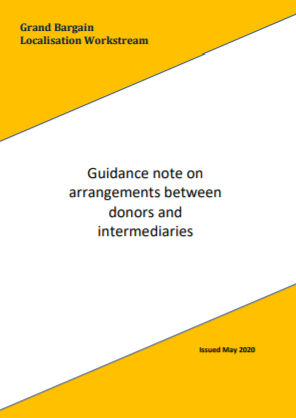 Guidance notes on localisation - May 2019 Guidance notes on localisation - May 2019
Building on existing and bespoke research, the findings from three “demonstrator country” missions, and discussions with Grand Bargain signatories and local actors in a series of regional and global conferences in 2018-19, the Grand Bargain localisation workstream issued a series of guidance notes on localisation in May 2020. These very brief notes set out priority findings, recommendations and considerations that signatories are encouraged to consider as they implement their commitments.
>> Click here to read the guidance notes
|
|
|
| Workstream 6 (A participation revolution) |
|
The Participation Revolution workstream welcomes the outcomes of the Annual Meeting 2020
The Participation Revolution workstream welcomes the outcomes of the Annual Meeting 2020, which broadly align with our current direction and workplan. In addition to championing participation in practice, we continue to work on the challenges of measuring participation in a meaningful way – while the success indicators remain useful for checking if your own organisation is effectively enabling the participation of affected people, it’s much more difficult to establish this collectively in a way that avoids heavy, bureaucratic procedures. We’ve formed a small group of donors, OCHA, and technical experts from the UN and NGOs to work out cost-effective approaches that work for the workstream and other stakeholders, though it’s unlikely we’ll have hard data to demonstrate a target hit by May 2021.
Beyond the workstream itself we continue to work with other workstreams on the enablers of effective participation – notably the effective and appropriate sharing of risk between different actors, growing the availability of quality funding, and localisation all of which enable devolved decision making that affected people can influence and be part of.
And we continue to work closely with the IASC, in particular Results Group 2 on accountability and inclusion, who remain key allies.
>> Click here to read the latest documents from the workstream |
|
| Workstream 7 & 8 (Enhanced Quality Funding) |
|
Catalogue of quality funding practices to the humanitarian response - July 2020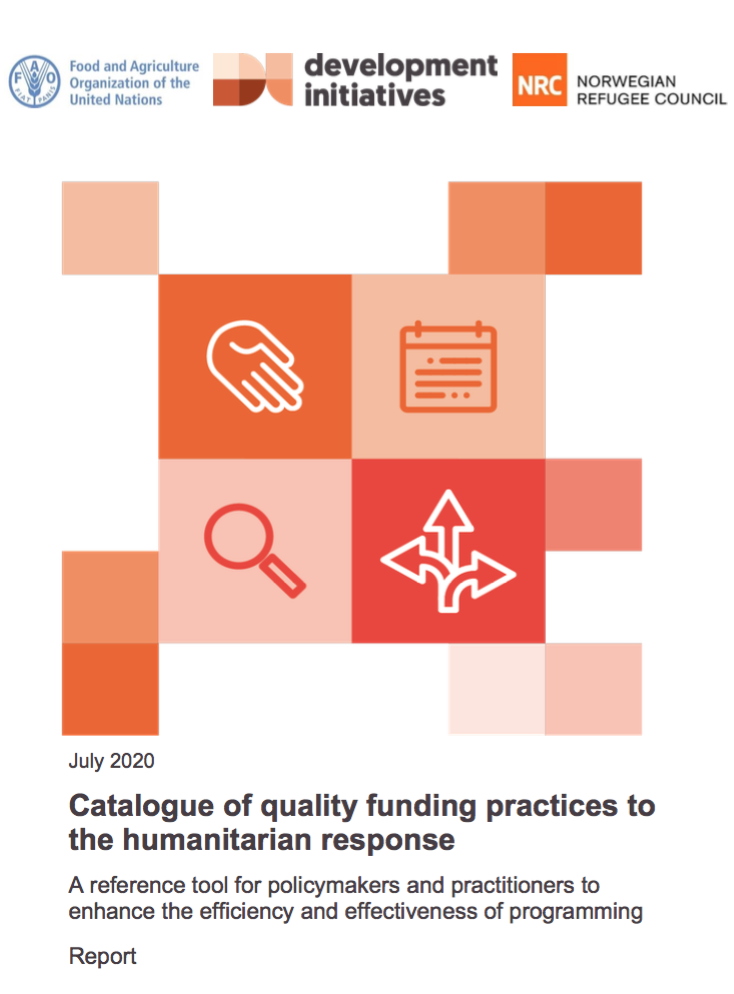
The Catalogue for Quality Funding Practices to the Humanitarian Response provides case studies and examples of best practices in quality funding that are available to be scaled-up and implemented. As the Grand Bargain enters its final year, 2021 is the time for action to achieve the Grand Bargain’s quality funding ambitions, building on the robust body of evidence on the value of predictability and flexibility of funding. NRC encourages donor’s policy makers and practitioners to use this resource to pick from, adapt and implement these quality funding example >> Click here to read the full catalogue
|
|
|
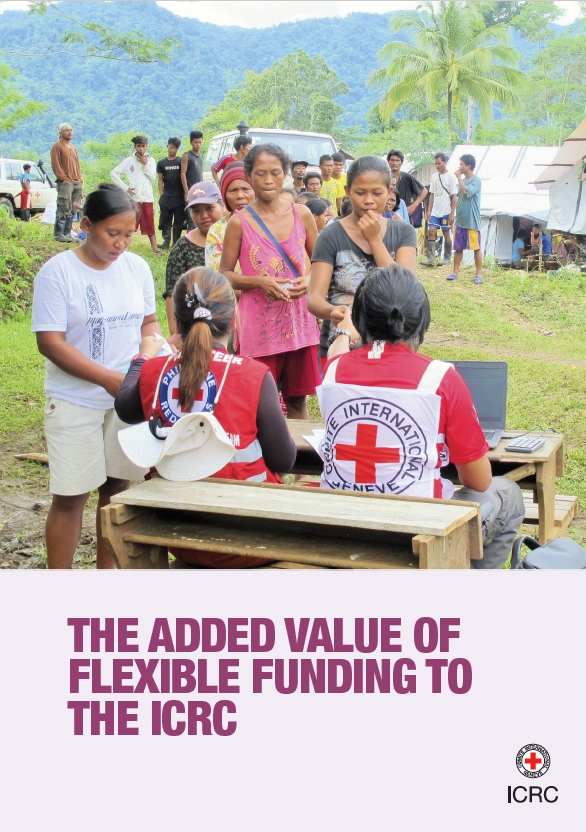 The Added Value of Flexible Funding to the ICRC - June 2020 The Added Value of Flexible Funding to the ICRC - June 2020
The availability of non-earmarked and loosely earmarked funding (hereafter flexible funding) is crucial for aid agencies to put the humanitarian imperative into practice. However, most multilateral and humanitarian organizations, including the ICRC, have witnessed a decline in the portion of their income received as unearmarked, core contributions. This report lays out the various ways flexible funding supports the ICRC’s work: from operations in the field to humanitarian diplomacy. >> Click here to read the full report
|
|
|
Quality funding: How to reach critical mass - June 2020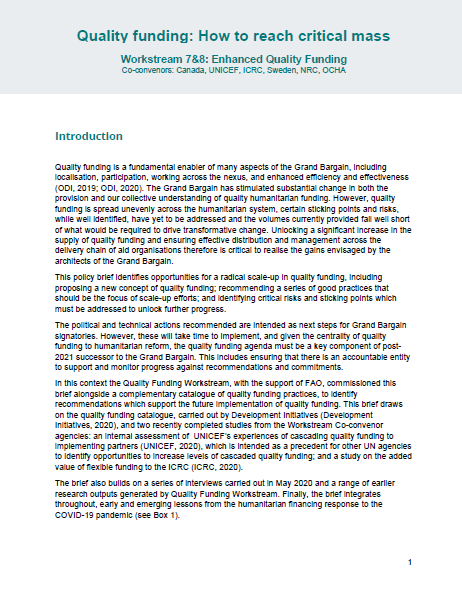
This policy brief identifies opportunities for a radical scale-up in quality funding, including proposing a new concept of quality funding; recommending a series of good practices that should be the focus of scale-up efforts; and identifying critical risks and sticking points which must be addressed to unlock further progress. >> Click here to read the full report
|
|
|
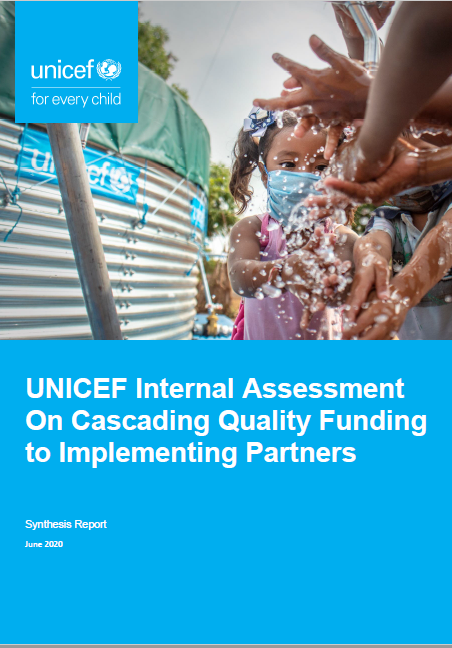 UNICEF Internal Assessment On Cascading Quality Funding to Implementing Partners - June 2020 UNICEF Internal Assessment On Cascading Quality Funding to Implementing Partners - June 2020
From January to April 2020, UNICEF conducted an internal assessment to support the overall objectives of the Grand Bargain workstream 7+8 on Enhanced quality funding.” In particular, the exercise aimed to address one of the Grand Bargain commitments related to the cascading of quality funding to implementing partners at the organizational level Information was collected through interviews with key informants. Additionally, the assessment was supported by the analysis of data available in VISION, UNICEF’s financial management system, and eTools. >> Click here to read the full report
|
|
|
| Workstream 9 (Harmonise and simplify reporting requirements) |
|
Key information on using the 8+3 Template to simplify and harmonize donor reporting
|
|
| Latest from the Facilitation Group |
|
Coming up
Based on the findings of the Grand Bargain Annual Independent Report 2020, the ODI think-piece, discussions at the Co-convenor meetings in May 2020 and the Grand Bargain Annual Meeting in June 2020, the Facilitation Group (FG) is now finalising the Annual Meeting summary note and devising the follow up actions and engagements to advance the progress on the Grand Bargain commitments at political level. By the end of 2020, the FG will develop a proposal on the future of the Grand Bargain post 2021 in consultations with the constituencies and building upon the ODI think-piece and spring discussions, for the Eminent Person's consideration.
At the end of July 2020, UK (DFID) will take over as FG Chair from OCHA for August and September 2020. In preparation of the 5-year stock-taking event in 2021, the majority of the current FG members would be interested to stay on for the next tenure to ensure continuity and avoid having a transition process. If you have any objections or suggestions in relation to that, please reach out to gbsecretariat@un.org.
Recap of recent activities
In May and June 2020, FG focused its efforts on preparing the content and logistics for the Grand Bargain Annual Meeting 2020, including by consulting their constituencies, analysing the remaining gaps in Grand Bargain implementation based on the Annual Independent Report 2020 and inputs from the Co-convenors, and lining up meetings with the Co-convenors and the Eminent Person.
Should you have any questions or suggestions in relation to the work of FG, don’t hesitate to contact the Secretariat.
|
|
| The Grand Bargain in Practice |
|
Embedding the commitments in Somalia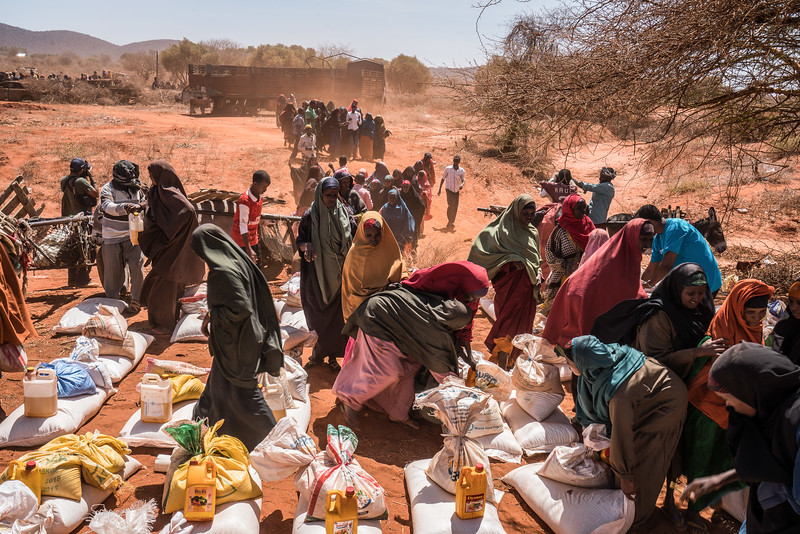
International and national humanitarian actors in Somalia have sought to embed many of the commitments under the Grand Bargain into their work, including through the Humanitarian Needs Overview and Humanitarian Response Plan, the Somalia NGO Consortium and the Somalia Humanitarian Fund. >> Click here to read more
|
|
|
Examples of Grand Bargain implementation at country level:
|
|
| This is not an exhaustive list of examples - for further information, please see the Grand Bargain Annual Independent Report 2020. |
|
Do you have examples of how your organisation rolled-out the Grand Bargain commitments at regional and country level? Share them with us here!
|
|
| Latest from the Signatories |
|
Mapping tool documenting the role of local actors in humanitarian action in the context of COVID-19
HPG are developing an online mapping tool which aims to document the role of local actors in humanitarian action in the context of COVID-19. It also explores how complementary ways of working between local and international actors contribute to humanitarian outcomes. To help them develop this tool, we would like to kindly ask you to spare a few minutes to please complete this short questionnaire. It collects evidence of contributions from local and international actors.The evidence will then be made available via an open-access Google Spreadsheet, and represented in an online interactive data visualisation. Please also share the questionnaire with relevant colleagues. |
|
|